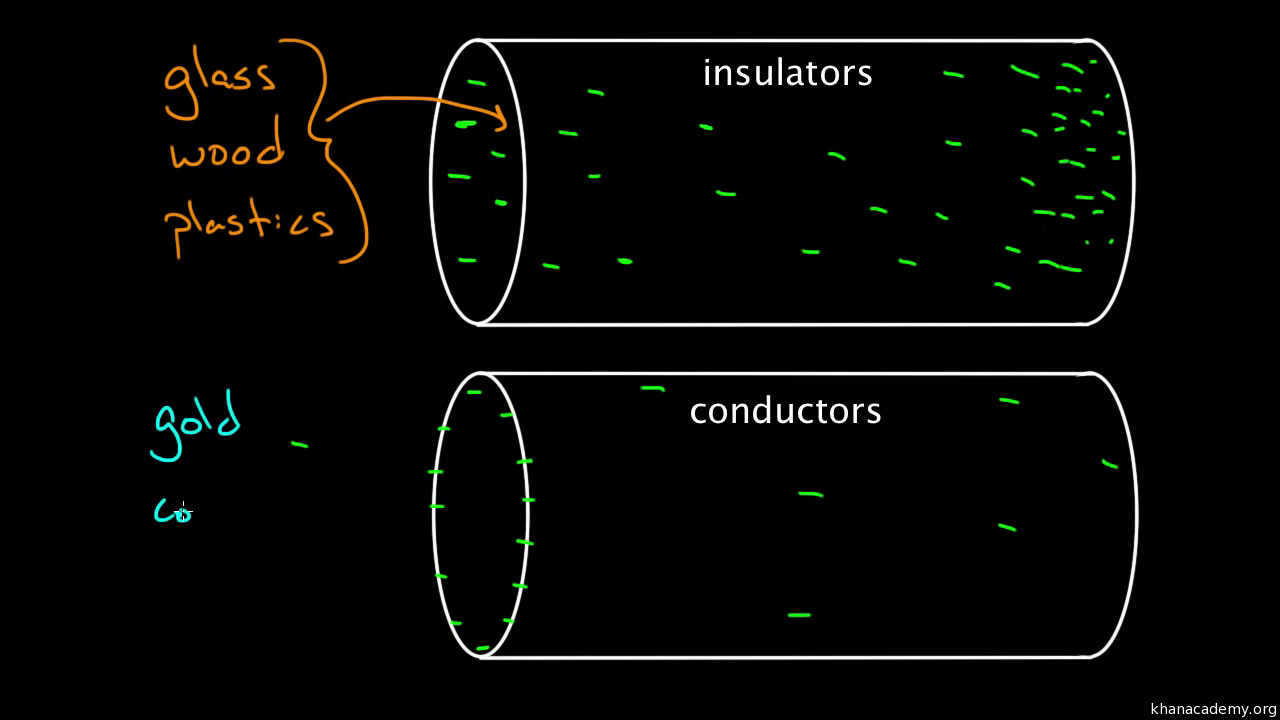Best Describes the Difference Between an Electrical Insulator and Conductor
Direct Current DC. 9 rows The conductors are used for making conductor wires and cables for carrying electric current.
Physics Tutorial Conductors And Insulators
Because superconductors show zero resistance towards thermal heat or electricity.

. This article covers the key differences between Conductor Semiconductor and Insulator on the basis of Conductivity Resistivity Forbidden Gap Conduction Band Structure Current Flow Band Overlap 0 Kelvin Behavior and ExamplesThe following table covers the key Differences between Conductor Semiconductor and Insulator. Main Differences Between Conductor and Insulator. This circuit works as an open circuit.
16 rows The conductor and insulator are the types of material. Two conductors separated by an insulator C. Two point charges separated by a distance.
Which sentence best describes electrical conductors. Conductors have high conductivity whereas insulators have low conductivity. Conductors have free charges while insulators dont have free charges.
Insulators have strong molecular bonds. Conductors can be charged by ___ while insulators cannot. Conductors in contrast have high thermal conductivity.
Superconductors conduct electricity the best. The conductors can pass electricity through them due to free electrons present in them. The Insulators valence band is filled.
The difference between conductors and insulators is that conductors are those materials that conducts electric current easily while insulators are those materials which do not conduct current easily. Thermal Conductivity Thermal conductivity inside insulators is low. Electrical conductors have high tensile strength c.
12 rows The main difference between the conductor semiconductor insulator is in its conduction. Electric charge or heat to pass through it easily. Electrons can move freely through conductors while insulators dont let them pass through.
Massive molecular bonds are contained in an Insulator. Another difference between conductors and insulators is in the movement of the electrons through them. A conductor allows electricity to flow through it easily and an insulator does not.
The conductor is the type of material which allows the electric current or heat to pass through it whereas the insulator does not allow the electric current or heat to pass through it. The most common difference between the two is that while conductors allow free flow of electrons from one atom to another insulators restrict free flow of electrons. One of the major difference between.
The electric field exists only on the surface of the conductor and it remains zero inside the conductor whereas it does not exist on an insulator. The conductor who is best at conducting heat and electricity has more free carriers present in them like electrons while insulator which is best at not conducting electricity do no contains many free carriers of. Conductors let current through while insulators do not.
Please check this. When the insulator connects to the other electrical power devices the current will not flow in the circuit. What conducts electricity the best.
However electrical charge or heat is not allowed to pass through an insulator. What is the difference between Electrical Conductors and Insulators. In other words an insulator is a material that blocks or hinders the flow of electric current or heat.
Electrical conductors have electric charges that move. Describe the two types of electric current and give examples of each. Conductor connect with an Electrical Circuit Insulator in Electrical Circuit.
The conduction band is vacant. A material that does not transmit electricity. Based on whether we are interested in a materials ability to conduct electricity or heat we use terms electrical conductorinsulator or thermal conductorinsulator.
While molecular bonds are very weak in conductors. Conductor Any material that conducts electricity. Iron copper aluminium etc.
While an insulator does not let electric current or heat to travel through it. The main difference between conductor and insulator is that a conductor conducts electricity or heat well whereas an insulator conducts electricity or heat poorly. The major difference between conductor insulator and semiconductor is defined by the flow of charged particles under the influence of electric field.
Thermal insulators do not transfer energy but thermal conductors do. Two insulators separated by a conductor B. Molecular bonds in conductors are weak.
Insulators have very low conductivity. Thermal insulators are mostly made up of large chains of molecules which are unable to vibrate due to thermal energy but most of the thermal conductors are made of single atoms or lattice shaped compounds which are. Two moving point charges that are in contact D.
Explain the difference between a conductor and a nonconductor insulator. A conductor is something which allows electric current to flow through it freely whereas an insulator prevents any electric current flowing through it. Well what an insulator does is to oppose the flow of current.
Nonconductor Insulator Also known as insulator. A conductor makes it easy to send energy eg an electric motor and heat transfer. When the conductor connects to other electrical power devices in the electrical circuit it forms a closed circuit.
Which of the following best describes a capacitor. A conductor allows energy eg. Conductors allow electrical energy to pass through them whereas insulators do not allow electrical energy to pass through them.
The conductor is considered as good at conducting electricity and heat whereas insulator is considered as poor conductor of heat and electricity. When any voltage is applied to the conductor electric charged particles easily flow from valence band to conduction bandThus conductor is a good conductor of electricity. Electrical conductors have low mass density b.
Electrical conductors have zero or very little resistance while electrical insulators have very high or infinite resistance. What is the difference between Thermal Insulator and Conductor.

Conductors And Insulators Video Khan Academy

Conductors And Insulators Definition Applications Differences Examples
No comments for "Best Describes the Difference Between an Electrical Insulator and Conductor"
Post a Comment